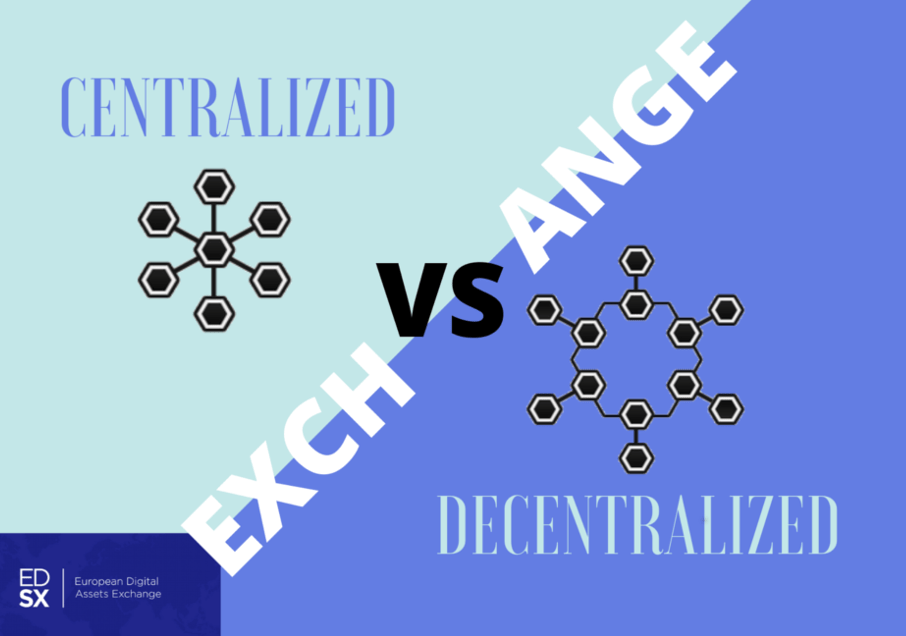This examination considers different frameworks for exchanging digital forms of currency, focusing on centralized vs decentralized exchange models. Historically, centralized systems have predominated, permitting users to conduct transactions through a third party intermediary. Nonetheless, decentralized solutions are arising that intention to expel the middle man by enabling direct engagement between counterparts. One such pioneering entity in this evolving area applies leading-edge technologies to generate novel peer-to-peer marketplaces for specialized investment assets. The following discussion aims to provide understanding into not only the benefits and drawbacks of each model, but also how they differ in their approach to centralized versus decentralized exchange.
What is a Centralized Exchange?
CEXs are important online marketplaces for buying and selling crypto. Centralization means using a middleman like a bank to help with transactions via trusting them.
Users trust exchanges to safely complete deals and match traders through their user networks.
Relying on third-parties to safeguard cryptocurrencies presents a major risk. If the third-party loses the key, they lose all the amounts as well. Decentralized exchanges mitigate this risk by allowing users to hold their own private keys. In the past, Exchanges have been ground for copious scams for this very reason, which proves that it much more secure storing crypto in one’s personal digital wallet.
Fiat/Cryptocurrency Pairs
It’s more common for a centralized exchange to offer cryptocurrency/cryptocurrency pairing: this allows customers to trade, for instance, bitcoin for ether tokens. Fewer exchanges offer fiat currency/cryptocurrency pairs, which would allow, say, bitcoin for USD exchanges.
Since many investors in the space are relatively new to investing in digital currencies, they may be more likely to turn to these types of exchanges. Some of these exchanges include Coinbase, Robinhood, Kraken, and Gemini.
Centralized Exchange for Digital Assets / Financial Securities
One of the most interesting tools is represented by SDX: it’s an exchange for financial tools for the Swiss market. Formed by a global community, their goal is to offer a world’s leading exchange for digital assets “where professional can access, transfer and store value”.
Various financial groups now seek licenses. However, centralizing exchanges when money is involved tends to go against productivity.
Often, gaining access to a certain exchange requires using a platform’s trading tools. Mandatorily, one must open an account with an intermediary like a bank to reach a platform allowing a market’s entrance.
Overall, centralization contradicts blockchain’s purpose of decentralization, removing middlemen entirely. The technology aimed to decentralize and avoid intermediaries.
Key Elements of Centralized Exchanges
High trade volume means low volatility and manipulation. Since transactions take time, prices can change between starting and finishing. Large volume and fast transactions reduce price changes being an issue.
Several factors impact the user experience when selecting an exchange. Exchanges trade different pairs and have varying trading volumes. Exchanges also actively adopt security measures to protect their customers.
What is a Decentralized Exchange?
Decentralized exchanges (DEX) are a type of cryptocurrency exchange which allows for direct peer-to-peer cryptocurrency transactions to take place online securely and without the need for an intermediary.
EDSX is one of those decentralized exchange.
About EDSX:
The EDSX platform is fully compliant with all the Swiss laws related to financial intermediaries, banking, anti-money laundering, as well as organized trading facilities. Among its core values, there are innovative solutions through blockchain technology that increase security and liquidity.
EDSX aims to enable the financial revolution fully. It is Europe’s first platform with primary and secondary markets for institutions and retailers. As pioneering platform, it employs leading tech to globally list security tokens in primary and secondary markets. EDSX lists digital securities of real instruments for public peer-to-peer trading.
Advantages? Decentralized exchanges offer plenty in comparison to traditional platforms. Traditional platforms require customers to pay a per trade fee. However, white-label decentralized exchanges operate similarly but collect only a “gas” fee when confirming trades through the blockchain. This confirms the transaction on the decentralized exchange.
…while EDSX is completely free-of-charge!
Anonymity provides another important consideration. While anonymity does not optimize security, decentralized exchanges involve no central authorities. Therefore, users can sign in and start trading without undergoing identity verification beforehand. It also allows the user to access the tools which are not available otherwise.
Ownership provides another difference. Centralized exchanges completely hold ownership of coins, allowing them to hold the keys. This enables faster executions since users do not need to provide access. However, it also exposes users more easily to scams. Decentralized exchanges put ownership directly in users’ hands. Decentralized Exchanges free the users from this risk.
It is mandatory for financial tools to keep registers – for example, a member register.
Lastly, liquidity: “Liquidity in crypto can be provided by crypto assets backed by traditional assets, aka by bridging crypto and fiat markets. Higher liquidity would cause faster transactions, more stable prices and therefore more market participants. This would boost the general public adoption of blockchain technology and crypto instruments and lead to “maturity” of the industry. While there are discussions around Crypto VS. Fiat worlds, crypto is more of an extension, the next evolution step for the financial market as a whole.”
Main differences between CEX and DEX
The crucial difference between centralized and decentralized exchanges is whether or not a middle man is present.
Centralized exchanges can be used to conduct trades from fiat to cryptocurrency (or vice versa) and to conduct trades between two different cryptocurrencies.
The risks associated with this are:
→ CEX can be hacked easily through which funds could be lost.
→ The entire exchange can disappear any given moment.
Security: the technology may change, but means stays the same (involvement of middlemen, banks, exchange etc). It doesn’t help progression.
Overall, decentralized exchanges provide an alternative by removing middlemen. They generate a “trustless” environment without escrow services. These exchanges work as peer-to-peer systems. Trades happen directly through smart contracts and atomic swaps.
Main features:
→ Enhanced Privacy due to no registration requirements or KYC process.
→ No deposit or withdrawal is required. All the transactions happening between peer-to-peer are handled by programmatically secure smart contracts.
→ No single point of failure, control or regulation.
→ It is totally compliant with the tech philosophy!

Based in Zug, the platform is fully compliant with all Swiss laws related to financial intermediaries, banking, anti-money laundering, and organized trading facilities. Among its core values, there are innovative solutions through blockchain technology, which ensures security and liquidity.
EDSX is the first platform in Europe with primary and secondary markets for both institutional and retails. EDSX is a pioneering platform that employs the world’s leading technology to globally list security tokens in both primary and secondary markets, listing digital securities of real financial instruments to the public with a decentralized peer-to-peer exchange. Our goal is to fully engage every aspect of the financial revolution.
Do you have a question for us?
Send your query here:
[email protected]

